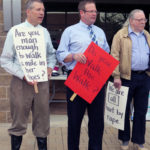Every year the U.S. bishops release a Labor Day statement focusing on an aspect of Catholic Social Teaching known as “The Dignity of Work and the Rights of Workers.” This year’s message emphasizes the need for stable work and a living wage so that families, and the greater community, can thrive. The statement calls on us to reflect on our actions and their impact on families’ ability to be self-supporting.
“We must not resign ourselves to a ‘new normal’ with an economy that does not provide stable work at a living wage for too many men and women,” writes Archbishop Thomas Wenski on behalf of his brother bishops. “The majority of jobs provide little in the way of sufficient wages, retirement benefits, stability, or family security, and too many families are stringing together part-time jobs to pay the bills.”
The U.S. Department of Labor reports that 8.3 million of our brothers and sisters, parents, spouses, children and neighbors were unemployed in July 2015. Blacks (9.1 percent) and Hispanics (6.8 percent) experienced the highest unemployment rates, compared with whites (4.6 percent) and Asians (4.0 percent).
More than 2 million people nationwide are enduring long-term unemployment (27 weeks or more). Imagine buying groceries for your family, filling up the car with gas, keeping up with bills and, after six months no source of income. In Iowa, unemployment runs out after 26 weeks. Another 668,000 “discouraged workers” nationwide were tallied in July 2015. These individuals have given up looking for work because they believe no jobs are available for them. We have a moral obligation to lift them up.
Archbishop Wenski asks us to think about “the violation of human dignity that is evident in exploited workers, trafficked women and children, and a broken immigration system that fails people and families desperate for decent work and a better life. How do we participate in this wounding of human dignity, through choices about the clothes we wear, food we eat, and things we buy — most of which is unaffordable to the very workers who make it?”
Several organizations in the Diocese of Davenport are working toward what Archbishop Wenski urges all of us to do: “build systems and structures that nurture family formation and stability in our own homes and neighborhoods.”
The Center for Worker Justice with the Iowa Federation of Labor convinced the Johnson County Board of Supervisors to support an ordinance to raise the minimum wage to $10.10 by 2017 in all cities within Johnson County. The board voted unanimously in favor of the ordinance Aug. 27; two more readings are required for passage. Misty Rebik, executive director of the Center for Worker Justice, says the center will continue to push for a livable wage, organize low-wage workers to join the movement and build up a coalition of faith and labor.
What can we do to help? Rebik suggests:
• Initiate study groups in our congregations to discuss Catholic Social Teaching on economic justice.
• Attend a Center for Worker Justice Allies meeting. The next one is Oct. 9 at noon at the CWJ meeting hall, 940 S. Gilbert Court, Iowa City.
• Host a presentation in our churches for workers to speak about their experiences.
• Stand in solidarity with local workers in their struggle for dignity.
A second organization, Quad Cities Interfaith, is planning a Jobs Readiness and DBE (Disadvantaged Business Enterprise) event Oct. 10 at Second Baptist Church in Rock Island, Illinois, to get people ready to work. Leslie Kilgannon, QCI’s executive director, says QCI is also working on opportunities for minorities to get into the trades so they have access to good-paying jobs, through such programs as the 100 Ready Workers Campaign. Some people don’t have access because of past biases they’ve experienced or lack of skill sets. “We want to address that.”
That’s where we, people of faith, come in. QCI needs volunteers for the 100 Ready Workers Campaign to mentor folks looking for work. If you’re interested, call Quad Cities Interfaith at (563) 343-3284.
This Labor Day and always, as Archbishop Wenski says, “let us pray, reflect, and act, seeking to restore our work and relationships to the honored place God has ordained for them.”
Barb Arland-Fye











